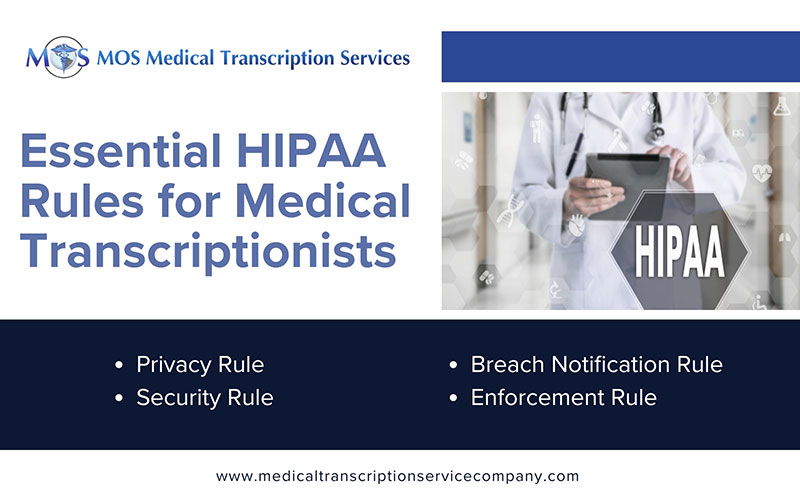
Table of Contents
Safeguarding the security, privacy, and confidentiality of patients’ healthcare data is essential for all healthcare professionals and organizations. Protecting patient privacy fosters trust between patients and their providers. When patients feel confident that their information is secure, they are more likely to provide accurate and comprehensive health details, resulting in improved diagnoses, treatments, and overall care. For healthcare providers considering outsourcing medical transcription, it is essential to collaborate with a HIPAA-compliant company. Such companies have several protocols in place to protect the patient information they handle, and keep updated with changes in HIPAA regulations to ensure compliance and avoid fines.
HIPAA Compliance in Medical Transcription
HIPAA requires that medical records and Protected Health Information (PHI) be stored and handled in ways that minimize the risk of incidental disclosure. As they convert audio recordings from healthcare providers into written documents, medical transcriptionists should adhere to the following HIPAA rules to protect patient information:
- Privacy Rule: This rule governs the use and disclosure of Protected Health Information (PHI). Transcription companies must ensure PHI is accessed only by authorized personnel and shared strictly for permissible purposes, such as treatment or billing, while maintaining patient confidentiality.
- Security Rule: This rule establishes standards for securing electronic PHI (ePHI). Transcription companies must implement safeguards such as data encryption, secure authentication, and access controls to prevent unauthorized access, tampering, or breaches.
- Breach Notification Rule: If a breach of PHI occurs, transcription companies are required to notify the covered entity (e.g., the healthcare provider) without unreasonable delay. The covered entity must then inform affected patients and, in some cases, the U.S. Department of Health and Human Services (HHS).
- Enforcement Rule: This rule establishes procedures for investigations, penalties, and compliance audits related to HIPAA violations.
Medical Transcription Services: Protecting Patient Privacy
Here are the key components of HIPAA compliance that every medical transcription company needs to have in place:
Encryption of Patient Data
Encryption is an essential tool for protecting patient data from unauthorized access, online threats, fraud, and legal consequences. All data and devices that contain ePHI should be encrypted to avoid unauthorized disclosures of patients’ sensitive information. HIPAA also mandates encryption for patient data that is in transit (data that is emailed or moved from one device or server to another). Due to constantly evolving technology, transcription companies need to work with their IT providers to implement the encryption method and software that best fits their needs.
Storage of Protected Health Information (PHI)
HIPAA mandates that both electronic and paper records are protected against theft, fire, water damage, and accidental destruction. Physical safeguards focus on securing the equipment and facilities where PHI is stored and controlling access to these areas. Administrative safeguards ensure the selection, development, and maintenance of appropriate security measures.
For paper records, transcription companies must implement physical safeguards, including locked file cabinets, surveillance, restricted access to storage areas, and controlled entry to facilities holding PHI. Access should be limited to authorized personnel with user identification, role-based access, and monitoring to track PHI access.
Devices that can be taken off-site must be encrypted, and staff should not use personal devices for work. Systems should use authentication methods such as multi-factor authentication, and procedures should be in place for lost or stolen devices.
Continuous Staff Training
Continuous training and awareness programs are crucial for medical transcriptionists to ensure compliance with industry standards and enhance their professional skills. Ongoing training is crucial to maintain the quality, reliability, and security of medical transcription services.
Regular training helps transcriptionists keep up with evolving HIPAA regulations, ensuring that they adhere to the latest legal requirements. Awareness programs provide them with the knowledge and tools to implement robust security measures, such as secure file transfer protocols, encryption, and best practices for data handling. As technology evolves, training helps transcriptionists learn to navigate new tools and systems that improve efficiency and accuracy while maintaining security standards.
Audits
Conducting regular security audits is essential to maintain the integrity and security of sensitive patient information. With cyber threats continually evolving, frequent assessments keep security measures up to date, ensuring robust defences against new vulnerabilities. Regular audits help detect weaknesses in systems, processes, or infrastructure, such as outdated software, unsecured networks, or insufficient access controls. This allows companies to address potential issues before they become actual security breaches, minimizing risk to PHI.
As a trusted medical transcription company, MTS is dedicated to ensuring the highest standards of patient data security and confidentiality. Our team stays updated on HIPAA rules, minimizing risk of violations and penalties. By rigorously complying with HIPAA regulations, we provide healthcare providers with the confidence that their patients’ information is in safe hands.



